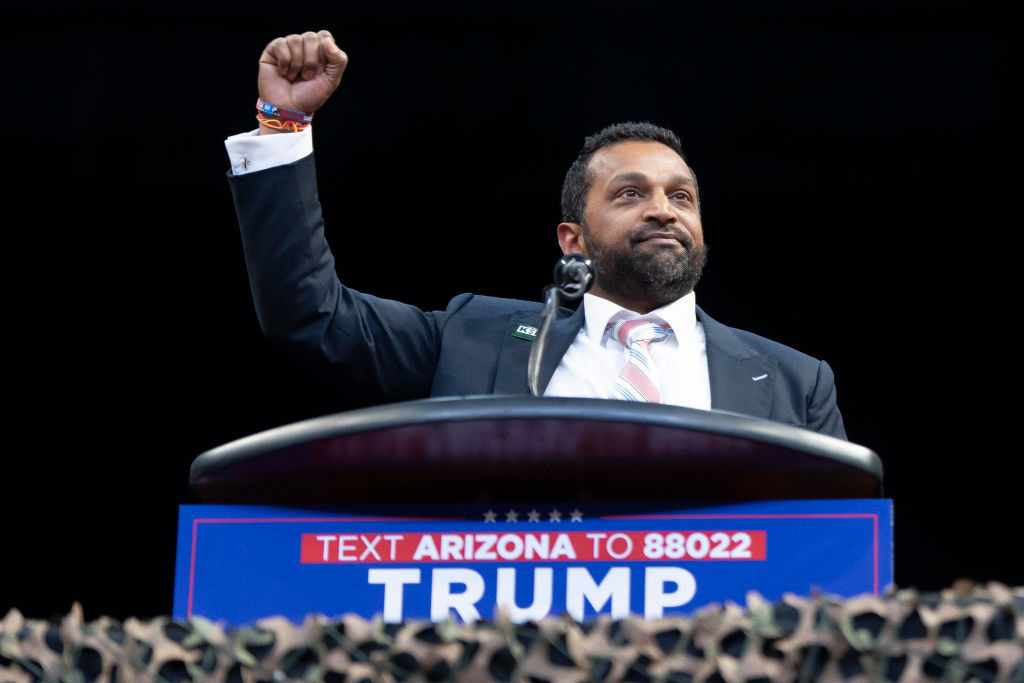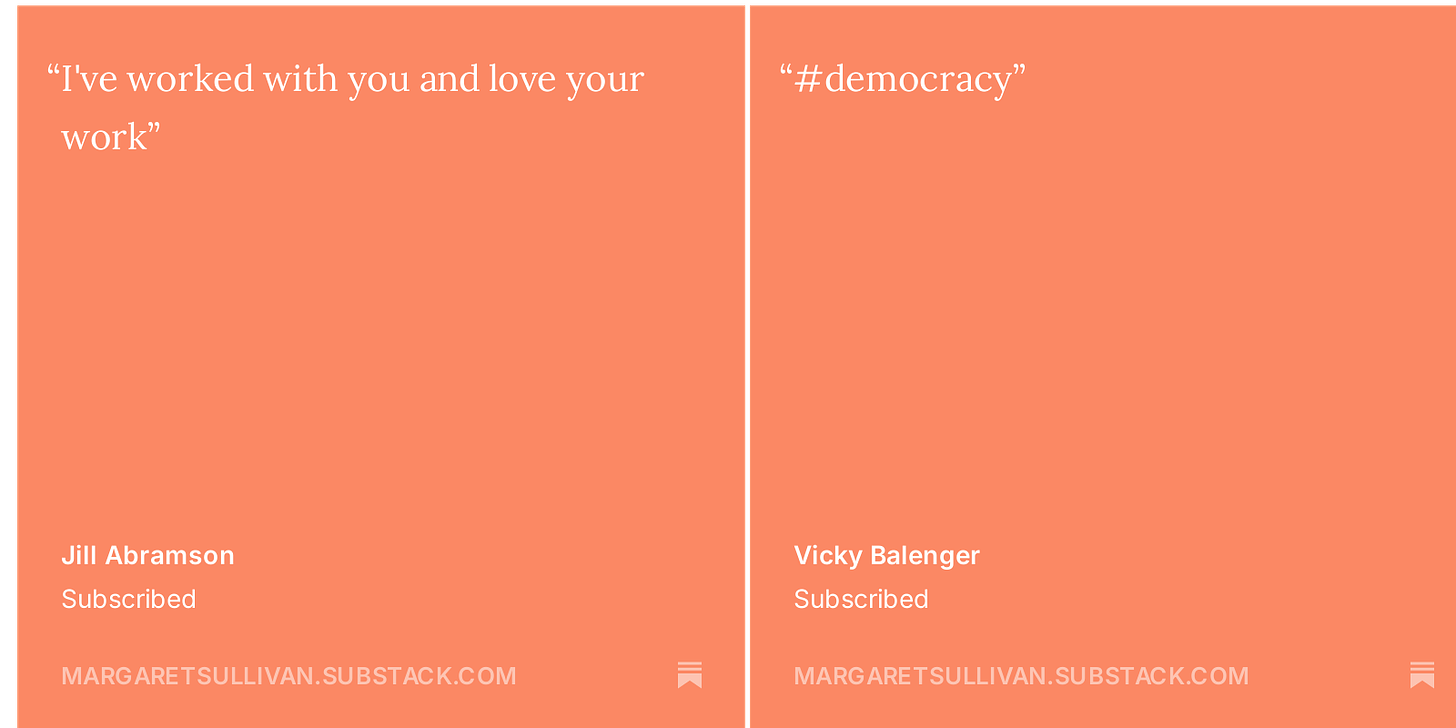My plea to newsroom leaders at this dangerous moment
We need you to have a strong spine, to state the truth without euphemism, and to communicate a clear sense of public mission.
Many of Donald Trump’s choices for Cabinet posts and other positions in his new administration have appalled me. To hit some lowlights: RFK Jr. with his dangerous ideas about vaccines and his history of wildly inappropriate behavior; Tulsi Gabbard, whom Russian state TV is referring to as “girlfriend”; Brendan Carr, one of the authors of the authoritarian playbook known as Project 2025; pure loyalist Pam Bondi, as attorney general, replacing the even more inappropriate Matt Gaetz.
But none have shaken me as much quite as much as Kash Patel, whom Trump wants to name the director of the FBI. Before the election, I wrote in the Guardian about the high stakes for press rights. After reviewing what a foe of the press Trump was the first time around, I sounded the alarm, with a particular focus on Patel:
There is nothing to suggest that Trump would soften his approach in a second term. If anything, we can expect even more aggression. Consider what one of Trump’s most loyal lieutenants, Kash Patel, has said.
“We’re going to come after the people in the media who lied about American citizens, who helped Joe Biden rig presidential elections,” Patel threatened during a podcast with Steve Bannon. “Whether it’s criminally or civilly, we’ll figure that out.”
If named FBI chief, Patel is sure to help bring Project 2025 into action. Again from the Guardian column:
Under Project 2025, seizing journalists’ emails and phone records would get easier. The editorial independence of Voice of America would be sharply curtailed; in fact, the global organization might be shut down altogether. Former officials who talk to reporters would be punished. Funding for NPR, PBS and public broadcasting would dry up.
“A pretty grim picture,” was the conclusion of Joshua Benton of Harvard University after analyzing Project 2025 from the perspective of press rights. “The first time around, there was at least a modicum of uncertainty about what a Trump administration would actually do,” Benton wrote in Nieman Lab. “The second time, voters knew better, and they rejected it. The third time? Well, no one can say it’ll come as a surprise.”

Remember, in his first term, Trump wanted then-FBI director James Comey to bring him a “head on a pike” when government insiders leaked to journalists — often providing information that was important for the American public to know. Patel, no doubt, will be eager to do this. And if raids and imprisonment of journalists follow, it’ll be exactly what the boss has wanted all along.
As many have pointed out, when would-be authoritarians take power, one of the first things they want to do is stamp out independent journalism. We can’t let that happen.
So, how can our most important journalism institutions react? With big doses of courage, a refusal to obey in advance and insistence on standing their ground. I hope that top newsroom leaders — the decision-makers at the New York Times, the Washington Post, CNN, Wall Street Journal, the broadcast networks and others — are clearly communicating to their staffs that they’re not going to knuckle under.
For inspiration, they ought to read a post by journalist Paul Horvitz (he worked at the late, great International Herald Tribune, among other papers), who wrote to me last week to share his manifesto. Here’s a section, and you can read the rest on his Substack:
In the United States of Donald Trump, American journalism faces a defining test.
Will it be the sleepwalking servant of a propaganda machine? Or will it reclaim its role as public servant, tenacious watchdog, and guardian of democracy?
Because we are not in normal times, these are not rhetorical questions. The coming year may well see the Department of Homeland Security offer journalists stage-managed tours of migrant jails to create a facade of humane treatment. Should the press participate?
The Trump regime will surely sanitize the language it uses to describe these camps, whose legal basis is questionable. Will a compliant press blindly repeat the euphemism “detention centers?” In 1930s Germany, millions of “asocials” were taken into “protective custody” or “preventive custody.” Words matter.
When an angry U.S. President phones the executive editor of The Washington Post or its billionaire owner to complain about “negative” coverage, will the attempt to intimidate be revealed only years later in a book or immediately placed on the front page?
Our alarming situation — we are on a path to American fascism — demands a far more assertive, scrappy, and resolute press. Some news organizations aren’t ready to be aggressive because they don’t accept their broader responsibility in a free society. They have been fact purveyors, always mindful of their own commercial viability. These news companies will continue to be enablers, justifying their behavior by championing strict impartiality, rigorous objectivity, and fast facts.
Horvitz nails it.
Meanwhile, I’m collecting examples of sanewashing, false equivalence and pussyfooting around the harsh reality of another Trump administration. Here’s a headline that even the satirical social media account New York Times Pitchbot said he couldn’t compete with; it appeared over a prominent Times staff columnist’s offering last week: “Thomas Friedman: Trump’s Path to a Nobel Peace Prize?”
Also in the Times, this euphemistic headline: “Trump’s Choices for Health Agencies Suggest a Shake-up Is Coming.” The sub-headline mentioned “ideas that are outside the medical mainstream.” Y’think? Author and scholar Ruth Ben-Ghiat expressed her objection: “Shake-up is hardly appropriate for the engineering of mass sickness by withholding vaccines and reducing insurance coverage so few can get medical help.” Language needs to be much stronger and more direct, especially in headlines and news alerts since that’s as far as many people ever get.
At the same time, I’ve noticed a lot of strong, important reporting in the Times, which remains essential. Here’s a gift link to one such story.
Thanks so much to all subscribers to American Crisis. I truly appreciate your interest and support. The paywall remains down so all may read these posts in full and may participate in the comments. The discussion has been robust and I’m grateful for the thoughtful contributions.
One last item: Greg Sargent of The New Republic invited me on his podcast last week to talk about Trump and the press. We covered everything from why The Times got rid of its public editor role (and why I predict it’s never coming back) to whether the mass cancellations at the Washington Post may motivate decision-makers to recommit to their mission. We also talked about the risk that news organizations may self-censor, given Trump’s threats of retribution against the press — and what to do about it.
Here’s the podcast recording and a transcript, if (like me) you prefer to read than listen.
And finally, I was delighted to welcome as a paid subscriber former NYT executive editor Jill Abramson, an astute press observer in her own right. Jill and I had our dustups, no doubt, but remain on good terms.
Welcome — and many thanks — to all. Hang in there with me for what’s going to be a rocky ride. And let me know your thoughts, including about President Biden’s pardon of his son Hunter.







MSM has failed us. Thank you for speaking up about this crisis in American democracy. Not all is lost - I am a federal government employee and many of my colleagues are resisting Trump's fascism: https://democracydefender2025.substack.com/p/public-servant-democracy-defender-introduction
So glad you are on the threats in store for journalism in this country. Patel is a screaming warning bell, but we can’t say we didn’t see this coming. The press needs to buck up the spines of R senators to demand FBI vetting across the board and to vote against dangerously anti-Constitutional candidates whose names Trump puts out there.
Pardoning Hunter was a brave moral act by his father who can see not only the malicious prosecution of his son already accomplished but the ongoing fervor of persecution coming at him as retribution for whatever Trump imagines his father has done. Bravo, Joe. Taking the heat so his son is spared it.